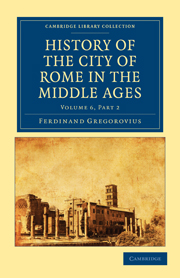CHAPTER V
Published online by Cambridge University Press: 05 July 2011
Summary
The death of a pope during the schism offered a favourable opportunity for the tranquillisation of strife, since, by refraining from holding any fresh election, one camp at least might have shown the world that it earnestly desired peace. The fourteen Roman cardinals were indeed doubtful whether or not they should give a successor to Innocent VII. But self-seeking and fear drove them into conclave on November 18, in order that the Roman Church should not be left without a visible head. They here signed a solemn declaration that if any among them was created pope, he should endeavour to effect a union and for its sake would renounce the tiara. They moreover explained that they only elected a new pope in order that he might act as “procurator” of the union. The elected candidate was also to pledge himself not to appoint any new cardinal.
Gregory XII., Pope, 1406–1409.
On November 30 the choice fell on the Cardinal of S. Marco, the Venetian Angelo Correr, who ascended the sacred chair on December 6, 1406. Gregory XII. in his first consistory declared that he would conscientiously abide by his oath. He assured his hearers, “that to speed the union” he “would hasten over sea and land; if by sea, even in a fishing boat, if by land, even with a pilgrim's staff.” Thus spoke a man of eighty, whom the cardinals had probably only elected because, according to human belief, ambition is generally changed into abnegation in the neighbourhood of the grave.
- Type
- Chapter
- Information
- History of the City of Rome in the Middle Ages , pp. 585 - 622Publisher: Cambridge University PressPrint publication year: 2010First published in: 1898

